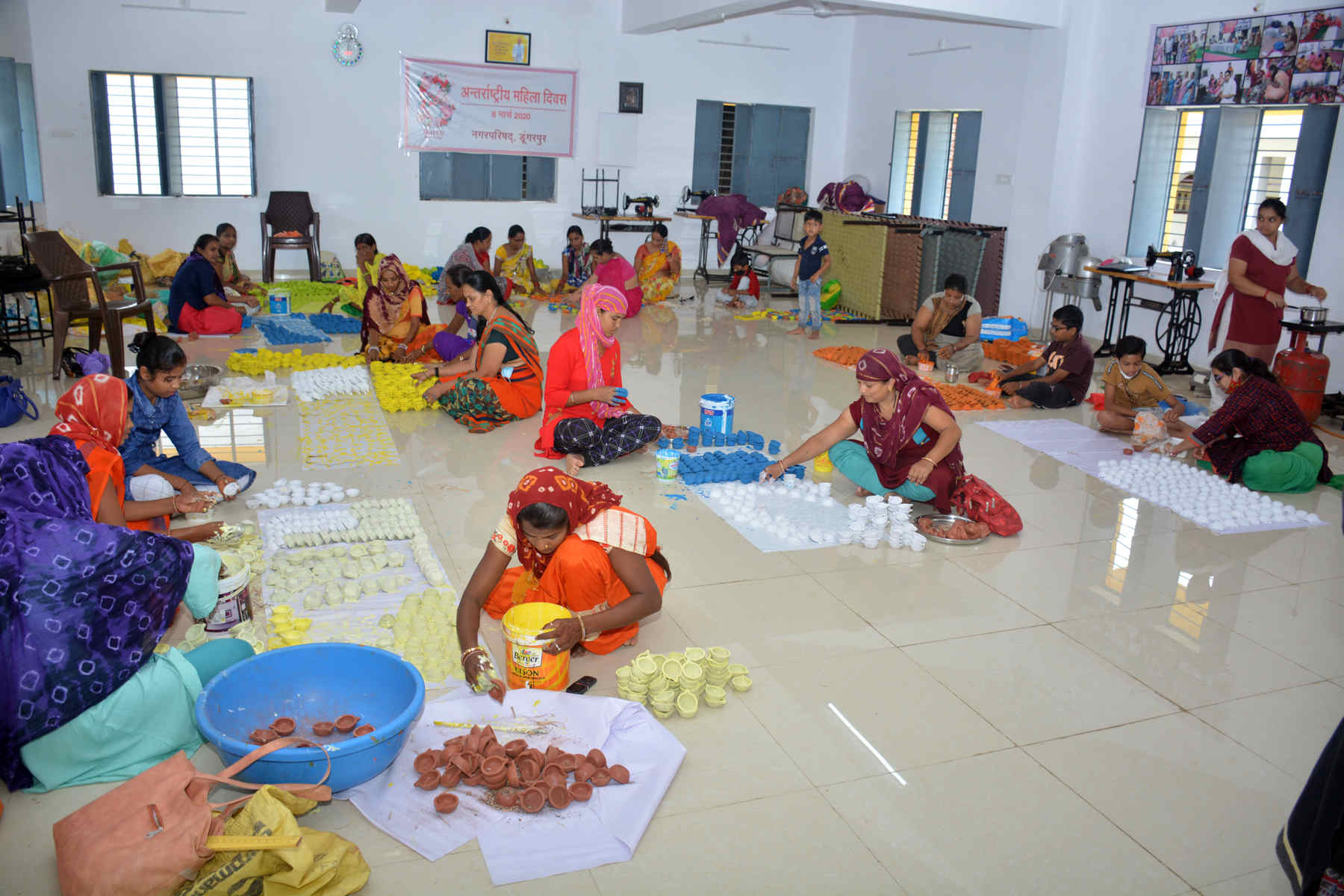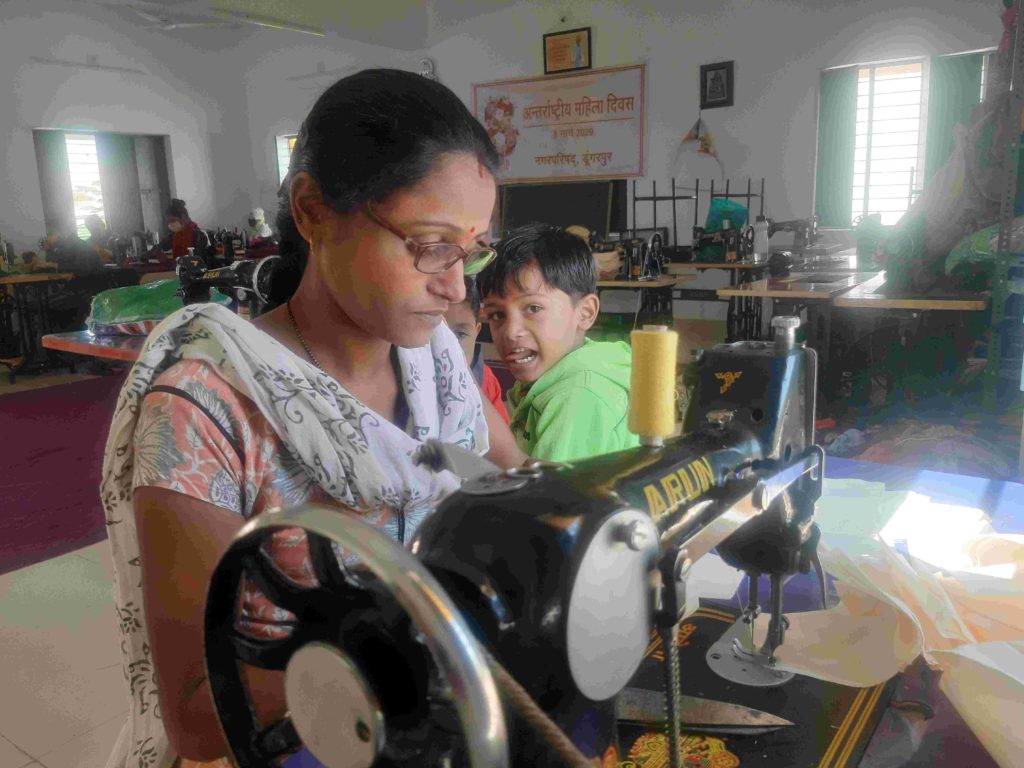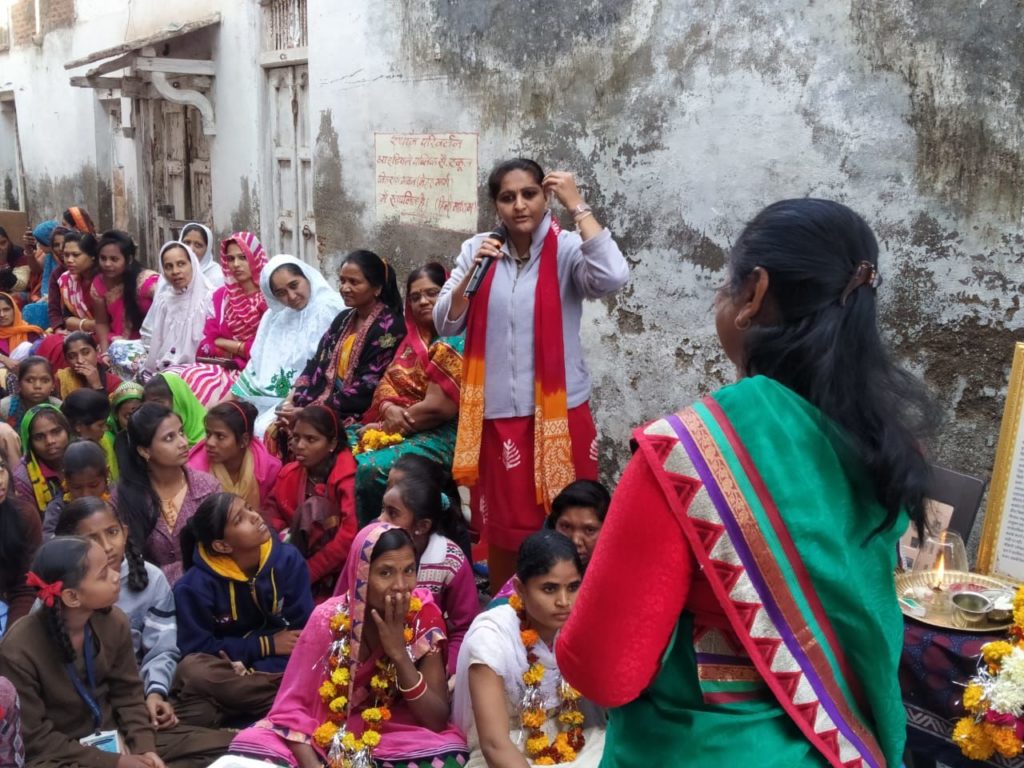Thousands of tribal women chart their own future after vocational training
About 4,300 women in Dungarpur and Banswara districts of Rajasthan have gone on to set up their own enterprises after undergoing skill development training offered by the Dungarpur Municipal Council and local non-profits.


Tribal women in Dungarpur, Rajasthan making diyas. All Pics: Madhav Sharma
Dungarpur and Banswara, Rajasthan
Dungarpur and Banswara, two predominantly tribal districts of Rajasthan, are infamous for poverty, malnutrition and high disease burden. While most young men migrate for work, the women are left behind to look after the children and elderly. These rural women lack employment opportunities and face economic hardships.
But joint initiatives by the local municipality and non-profit groups are helping tribal women in these districts script their success stories.
Women are being trained in sewing and embroidery and taught to make sanitary napkins, masks, papads, diyas and candles.
Today, about 4,300 tribal women — 800 in Dungarpur and 3,500 in Banswara — are reaping the benefits of such training imparted to them in the last two years.
“There are no big companies or permanent means of employment available locally. The men go to Gujarat looking for jobs, but what will the women and girls do?” KK Gupta, former chairperson of Dungarpur Municipal Council, asked Gaon Connection.
Also read: Millet magic: Kodo and Kutki calling in Chhattisgarh
Towards self-reliance
It was in 2018 that the Dungarpur Municipal Council began training centres for women in six wards with 10 sewing machines each. Eventually, these were merged into four centres, where about 200 women undergo training. During training, raw material is provided to them free of cost.

In two years, about 800 women have left the centres after receiving training that gives them a shot at earning. The centres operate in Shastri Colony, Sonia Chowk, Ghati and New Colony. One of them has been handed over to a non-profit institution called Unnati, and the other three are run by the Dungarpur Municipal Council.
Hansa Shrimal, a trainer at the centre run by Unnati, told Gaon Connection that, earlier, her centre used to operate with a batch of 50 women. At present, because of the COVID-19 pandemic and physical distancing norms, it is down to 25, “Most of those who attend the training are in dire need and shoulder the responsibility of their families,” Shrimal said.
Also Read: Women in Varanasi set to enter the world of toy making traditionally occupied by the menfolk
Among the current trainees at Shrimal’s centre, 12 are divorced or widowed and the rest are survivors of domestic violence and other hardships. “During the pandemic, a million masks have been made at these centres. We are providing free training to women in need,” Shrimal said.
Many of the trainees now work independently. “They take raw material from us and work from home,” said Shrimal, adding that tribal women who used to migrate to Gujarat with their families in search of a livelihood have also opted for this training.
Also read: Three Tharu tribe women contest the UP panchayat elections. On unreserved seats
Seema from Phoonali village, 20 kilometres from Dungarpur city, earns Rs 5,000 a month, after being trained at Unnati. It allows her to look after her two children well. She used to suffer domestic abuse, and her husband, who used to earn Rs 6,000 a month, lost his job during the pandemic.

Like Dungarpur, tribal women of Kushalgarh tehsil in Banswara district are becoming self-reliant with their craftsmanship. Usually, the highest migration of tribals from Kushalgarh tehsil is to the neighbouring state of Gujarat. Nidhi Jain, a social worker, began Pratidhwani, a skill development centre, in the region in December 2016 with 55 women from the tribal community.
Today, about 3,500 women are associated with the Sakhi programme of Pratidhwani and learn to do a variety of things along with sewing and embroidery.
Soumya Kharhiya, who is associated with the Sakhi programme, hails from the tribal community at Potliya village in Kushalgarh. Kharhiya said, “In 2018, I joined Pratidhwani and learned stitching. Today, I am self-reliant and work at the institute itself. I made about thirty thousand masks during the lockdown.”
Kharhiya added, “Before 2018, I used to earn less than three thousand rupees as a domestic helper. Now, I learn up to ten thousand rupees from sewing. I am the sole earner at home and still am able to run my household comfortably,” she said.
“The condition of women in tribal districts is worse than that of men on every scale. In such a situation, women will gain social equality with men only if they are financially capable. Seeing our work, the TAD [Tribal Area Development Commissioner] has given us the responsibility of linking women in other areas too with the project,” Jain said.
Jain pointed out that along with skill development, the confidence of women has also received a boost. Some have even gone on to set up self help groups and make pickles and papad. Others pick up employment in the field of sewing.
“Until some years ago, they had not even stepped out of their houses. Today, they are travelling all by themselves to big cities like Delhi to sell their goods,” she added.
Read the story in Hindi here.

